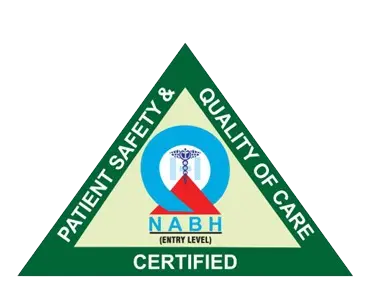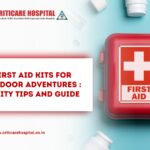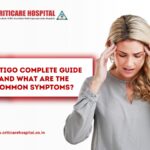Brain stroke, also known as cerebral vascular accident (CVA), is an emergency in which any person of any age can become a victim at any moment. It happens when the supply of blood to one section of the brain is cut or diminished, thus leaving the brain cells of that particular section lacking oxygen and nutrients. Failure to get these cells treated within a few minutes causes them to start dying.
The consequences of stroke may vary, ranging from minor or even life-threatening, and in most situations, it may result in permanent disability. This is why it is important to identify the symptoms at the first stage and seek medical aid immediately to rescue people and prevent their loss.
In this guide, we are going to run through what exactly causes a stroke, the symptoms to be wary of and how doctors will diagnose it all in simple terms.
Knowing about a Brain Stroke
It is your brain that takes care of all things, including breathing and movement, as well as speaking and memorising. It must have a continual refreshment of blood rich in oxygen to do this. This blood flows through arteries.
The supply is interrupted if one of these arteries becomes blocked or bursts. What we term a stroke is this. The classification of the type and seriousness of the stroke can vary, based on the place and manner of blood circulation disruption.
Two types prevail:
- Ischemic Stroke – The most common one. Occurs when arteries to the brain get blocked by blood clots.
- Hemorrhagic Stroke-This condition occurs due to bleeding when the blood vessel in the brain ruptures.
There is also a similar condition of Transient Ischemic Attack (TIA), or “mini-stroke”, in which symptoms are experienced temporarily and resolve themselves. But TIAs are red alerts; they indicate that you are highly likely to be hit by a full stroke shortly.
Reasons for a Stroke of the Brain
There are several health conditions and life habits which can cause stroke. It is good to know these causes so that you can take precautions to avoid them.
High Blood Pressure ( Hypertension)
The largest source of stroke. Arteries become vulnerable to bursts or obstructions due the high blood pressure, as it causes the weakness and destruction of arteries.
Blood Clots
The blood vessels of the brain can develop clots, or the same clots can move to them along with other body parts, such as the heart and block the arteries of the brain.
Atherosclerosis
It is at this point that the fatty deposits (plaques) form within the arteries and cause them to become narrowed and decrease the blood flow.
Heart Diseases
Blood clots that reach the brain may be triggered by such conditions as atrial fibrillation (irregular heartbeat).
Uncontrolled Diabetes
Eventually, elevated blood sugar levels destroy blood vessels and predispose a person to various kinds of strokes (ischemic and hemorrhagic).
Traumatic Brain Injury or Brain Aneurysm
They can tear up blood vessels, which results in bleeding in the brain.
Lifestyle Factors
All these risk factors include smoking, drinking too much alcohol, not exercising, and high-fat and salt-containing food.
Symptoms You Should Never Ignore
A stroke comes suddenly, and the symptoms emerge very fast. The sooner you can identify them, the easier the ability to recover. The most common way to memorise the symptoms of stroke is the rule of FAST:
F- Face Dropping: A person may feel like one side of the face is drooping or numb. Tell the individual to smile; an off-balance smile is a red flag.
A- Arm Weakness: One arm can be numb or weak. Have them hold their arms overhead- once one of them starts falling, that is a sign of issues.
S – Speaking Difficulty: Slurred/odd speech is a red flag. You can request them to repeat a simple sentence.
T – Time to Act: In case you see any of these signs, call emergency services.
Other symptoms might consist of:
- Sudden difficulty in comprehending speech
- The developed vision issues with one or both eyes unexpectedly
- Straightforward walking difficulties, loss of balance or lightheadedness
- Mysterious bad headache
- Weakness, numbness of the arm or leg (mostly one side of the last one)
Why Time Matters in Stroke
During a stroke, the brain loses millions of cells per minute. This damage is irreversible- however, with early treatment, it may halt it before further damage spreads. Time is brain is a common phrase used by doctors, as the quicker a person receives assistance, the more brain functionality can be preserved.
In the case of ischemic strokes, some of the clot-dissolving medications are most effective when used within the first 3 to 4.5 hours of the symptoms. By contrast, in hemorrhagic stroke, emergency surgery might be necessary to stem the bleeding and decongest the brain.
Diagnosis: How Doctors Diagnose a Stroke
Our highly trained team of stroke care providers is equipped with state-of-the-art tools to assist in the timely diagnosis and treatment of strokes at CritiCare Hospital Neurology Department. This is generally how a patient with stroke symptoms is treated:
History of the Illness and Physical Exam
Physicians will inquire about symptoms and how and when they appeared, as well as any underlying health conditions. They will also test reflexes, muscle strength, speech, vision, and coordination.
Brain Imaging
This is essential to establish the stroke type:
- A CT Scan Diagnoses spots bleeding or other issues in the brain.
- MRI provides a detailed image to reveal brain damage.
Blood Tests
They aid in the determination of sugar levels, clotting capacity, and the presence of infections and general ailments.
Heart and Blood Vessel Testing
- Electrocardiogram (ECG) -seeks cardiac issues that could give rise to clots.
- Echocardiogram- Performs a test using ultrasound to diagnose heart performance.
- Carotid Ultrasound: Examines whether there are blockages in the neck arteries that feed the brain.
Stroke Prevention
You can control health conditions and live healthier to decrease your risk of a stroke, but certain factors that are risk factors, such as age and familial history, cannot be altered:
Maintain blood pressure in check
- Regulate diabetes and cholesterol
- Quit smoking
- Reduce drinking alcohol
- Exercise regularly
- Eat well-balanced, healthy food that is high in fruits, vegetables, and whole grains
- Keep up to normal weight
- Take periodic health exams
Post Stroke Life
The outcome of recovery will depend on the severity of the stroke and the early response to treatment. Rehabilitation can comprise:
- Physical exercises for the recovery of movement and strength
- Enhanced talking and swallowing with speech therapy
- Occupational therapy to learn everyday activities again
- An emotional support and counselling against changes
Those family members are equally important in the process of recovery since they encourage healthy practices and follow-up medical visits.
The Commitment of CritiCare Hospital regarding Stroke Care
We know that time is very crucial in case of stroke and CritiCare Hospital Lucknow. The 24/7 stroke care team is trained, and the diagnostic tools we use, along with the treatment, are the latest in line in order to save lives and restore quality of life.
We are not only concerned with emergency treatment but also can provide preventive screening, lifestyle counselling and rehabilitation services as means of helping the patients reduce the chances of stroke in the future.
Final Words
A brain stroke is not simply a health problem, but it is a race against time. Early recognition of symptoms, acting fast, and proper medical treatment can make a difference between full recovery and permanent handicap.
CritiCare Hospital each existence ensures that its patients may receive prompt, accurate, and humane treatment for a stroke. It may be emergency care, prevention counselling, or a rehabilitation service, but we always aim at preserving your brain and future.




